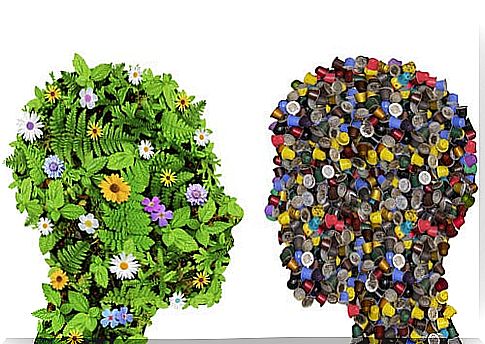Internal Dialogue Changes Your Brain

Self-talk changes your brain. That daily talk you have with yourself can strengthen a large number of brain areas to help you better manage stress, regulate your mood or even help you to be more decisive. On the contrary, the negative speech that wears you down can certainly lead you into very debilitating and damaging states.
There is an especially curious fact that many will have experienced at some time. It is common, for example, that one is always that tireless friend who is always there when needed. We stand up as that person who inspires courage, who knows how to give the right word at the most needy moment; we are in some way, that unquestionable support for others that with its always successful communication instills value, enthusiasm and positivity.
On the contrary, for ourselves we can sometimes be the worst enemy. Our internal dialogue often resonates with phrases such as: “ How have you been able to say such nonsense? You are clumsy ”. “Don’t you dare try that other, you are useless in these matters and you know it”, “look at what happened today, you are always wrong, you are always making one mistake after another.”
We are what we say to ourselves and, sometimes, we have lived a whole life with an internal voice that stands as the worst abuser of all. It is not easy to change that internal discourse when we have been doing it for so long. However, it is necessary to do so for an obvious reason: negative self-talk changes the brain and makes us more vulnerable to anxiety disorders and depression.

Self-talk changes your brain, what you say to yourself defines you
The impact of internal dialogue on our behavior and personality is a topic that has always interested psychologists. We know, however, that in recent years there have been many books and publications on self-help and personal development that encourage us to take care of this dimension. However, it is interesting to know that the subject of internal discourse has studies dating back to the beginning of the 20th century.
It was in fact Lev Vygotsky, the famous Russian psychologist, who first wondered if the brain uses the same mechanisms when the person speaks aloud as when it speaks silently and to itself. The answer to this question could not be more curious: various studies have shown us that when we maintain these common internal conversations, areas such as the lower left frontal gyrus (Broca’s area) are activated, which are also present when we communicate aloud.
Internal speech is, therefore, a complex and multifaceted phenomenon, so much so that we should be more aware of how it affects our brain and our psychological health. An example, Charles Fernyhough psychologist at the University of Durham, in the United Kingdom, explained to us in his book Internal Voices , that this internal chatter generates about 4,000 words per minute. That is, internal dialogue works 10 times faster than verbal speech.
Therefore, everything that happens in our mind, every idea, thought, self-instruction and assertion, has an enormous impact on us; both positively and negatively.
Negative self talk, emotions and the brain
John H. Krystal, editor of the scientific journal Biological Psychiatry and professor at Yale University School of Medicine, carried out a study to demonstrate the impact of emotions on our brain. Something that highlighted how negative and persistent self-talk weakened multiple neural structures, making people much more vulnerable to stress.
Structures such as the insula and amygdala showed high hyperactivity. These areas related to emotions such as fear or attention towards the threats in our environment sometimes put us in states of great psychological wear. Furthermore, we cannot ignore that negative dialogue is that substrate that feeds anxiety and that often places us in the labyrinth of depression.

Thoughts and health: what if we talk to each other in a more affectionate way?
We need to become aware of one thing. Our internal dialogue can directly affect our health, both physical and psychological. That limiting talk that cuts down on self-esteem, that shuts down our potential, our resources, and opportunities, deserves more dedication to change your approach.
We must be able to change that harmful discourse. A simple resource to achieve this is the following: instead of speaking to us in the first person (I am this, why will I have done that), the ideal is to start addressing us in the second person. We will assume the role of that friend who wants the best for us but who, at the same time, is always attentive to correct our mental speeches.
An example of this resource would be the following dialogue: “ I understand that you are worried, but remember that you have resources to overcome this. You’ve done it before, so trust yourself. You deserve the best, you are strong, give it a try ”.
To conclude, we are aware that this process takes time. Changing that limiting internal speech can be difficult at first, but if we commit to ourselves, we will see changes little by little. For this, it is worth remembering what an old Chinese proverb told us:









